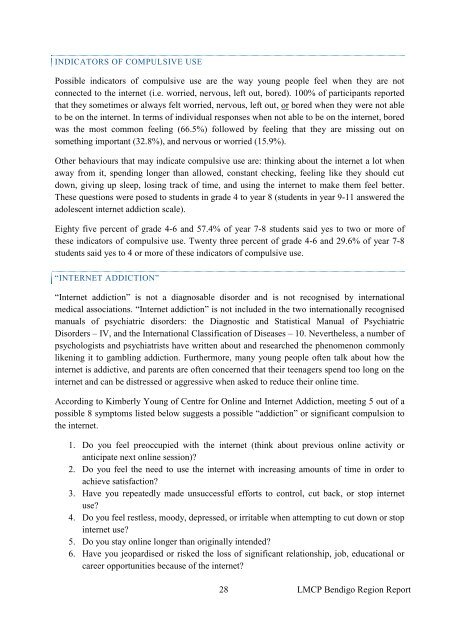LODDON MALLEE - Cyber Safe Kids
LODDON MALLEE - Cyber Safe Kids
LODDON MALLEE - Cyber Safe Kids
You also want an ePaper? Increase the reach of your titles
YUMPU automatically turns print PDFs into web optimized ePapers that Google loves.
INDICATORS OF COMPULSIVE USE<br />
Possible indicators of compulsive use are the way young people feel when they are not<br />
connected to the internet (i.e. worried, nervous, left out, bored). 100% of participants reported<br />
that they sometimes or always felt worried, nervous, left out, or bored when they were not able<br />
to be on the internet. In terms of individual responses when not able to be on the internet, bored<br />
was the most common feeling (66.5%) followed by feeling that they are missing out on<br />
something important (32.8%), and nervous or worried (15.9%).<br />
Other behaviours that may indicate compulsive use are: thinking about the internet a lot when<br />
away from it, spending longer than allowed, constant checking, feeling like they should cut<br />
down, giving up sleep, losing track of time, and using the internet to make them feel better.<br />
These questions were posed to students in grade 4 to year 8 (students in year 9-11 answered the<br />
adolescent internet addiction scale).<br />
Eighty five percent of grade 4-6 and 57.4% of year 7-8 students said yes to two or more of<br />
these indicators of compulsive use. Twenty three percent of grade 4-6 and 29.6% of year 7-8<br />
students said yes to 4 or more of these indicators of compulsive use.<br />
“INTERNET ADDICTION”<br />
“Internet addiction” is not a diagnosable disorder and is not recognised by international<br />
medical associations. “Internet addiction” is not included in the two internationally recognised<br />
manuals of psychiatric disorders: the Diagnostic and Statistical Manual of Psychiatric<br />
Disorders – IV, and the International Classification of Diseases – 10. Nevertheless, a number of<br />
psychologists and psychiatrists have written about and researched the phenomenon commonly<br />
likening it to gambling addiction. Furthermore, many young people often talk about how the<br />
internet is addictive, and parents are often concerned that their teenagers spend too long on the<br />
internet and can be distressed or aggressive when asked to reduce their online time.<br />
According to Kimberly Young of Centre for Online and Internet Addiction, meeting 5 out of a<br />
possible 8 symptoms listed below suggests a possible “addiction” or significant compulsion to<br />
the internet.<br />
1. Do you feel preoccupied with the internet (think about previous online activity or<br />
anticipate next online session)?<br />
2. Do you feel the need to use the internet with increasing amounts of time in order to<br />
achieve satisfaction?<br />
3. Have you repeatedly made unsuccessful efforts to control, cut back, or stop internet<br />
use?<br />
4. Do you feel restless, moody, depressed, or irritable when attempting to cut down or stop<br />
internet use?<br />
5. Do you stay online longer than originally intended?<br />
6. Have you jeopardised or risked the loss of significant relationship, job, educational or<br />
career opportunities because of the internet?<br />
28 LMCP Bendigo Region Report


